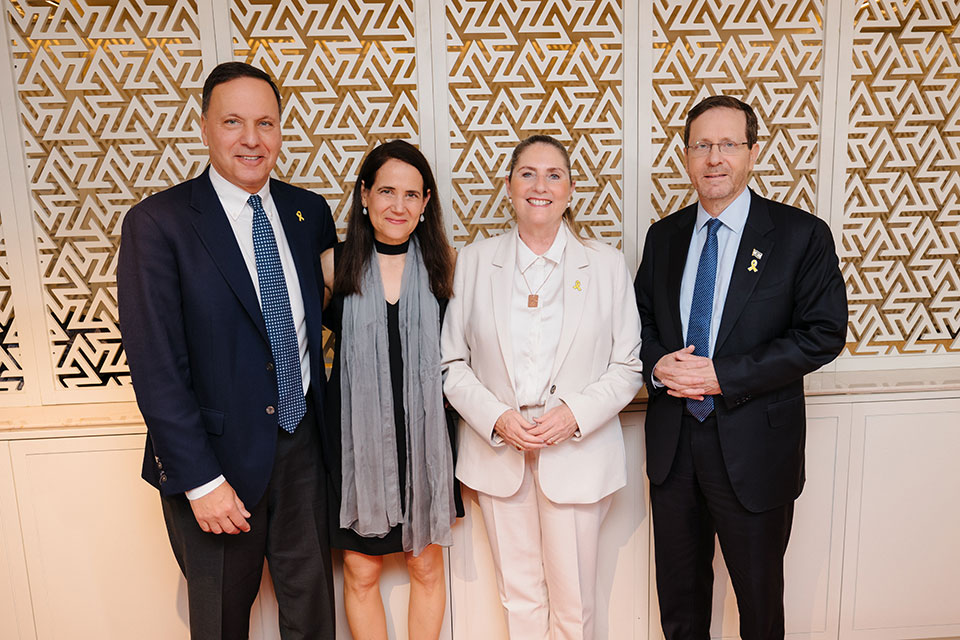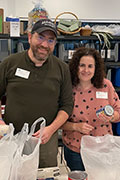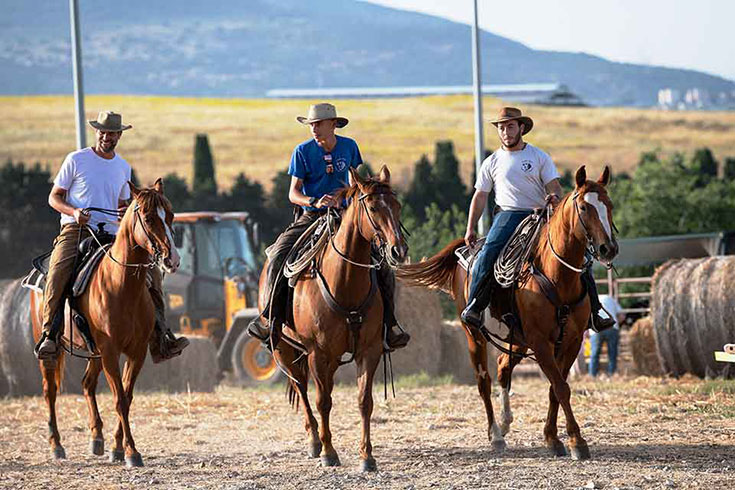Sharing 75th Anniversaries

By Ron and Jessica Liebowitz
Earlier this spring, we were honored to travel to Israel to commemorate the shared 75th anniversaries of Brandeis University and the state of Israel. This was our first trip back since the Hamas atrocities of October 7, and the explosive re-emergence of antisemitism on American college campuses and around the world. We went with deep awareness of the challenges confronting Israeli society at this moment, including severe national security threats associated with Hamas, Hezbollah, and Iran, and also the legacy of extreme dysfunctionality in governance in 2023 that looked to many as the beginnings of civil war.
We felt the impact of these challenges on the mood of everyday life as soon as we landed and went through the regular motions of getting through Ben Gurion Airport. The airport crowds and staff did not exude the energy as we’d remembered from trips past. We heard it in conversations continually returning to the priority of getting the hostages back, preventing more terrorist attacks like the one that occurred on October 7, and identifying mechanisms for pushing past the failures of political and military leadership. We also felt a distinct openness in the people we encountered, which helped deepen our recognition of the special bond that ties together Brandeis University and the state of Israel.
We hosted and met with Israeli politicians, business people, military leaders, philanthropists, university presidents, professors, students, journalists, kibbutzniks, and parents and family members of hostages, all with some connection to Brandeis as alumni or friends of the university. It was not a surprise to encounter such depth in the connections between Brandeis and Israel, reflecting founding president Abram Sachar’s conviction that Brandeis University would always retain its strong ties to Israeli institutions of higher education.
“It was not a surprise to encounter such depth in the connections between Brandeis and Israel, reflecting founding president Abram Sachar’s conviction that Brandeis University would always retain its strong ties to Israeli institutions of higher education.”
At the come-all gathering we hosted in Tel Aviv for Brandeis alumni and friends, close to 200 guests exuded positivity, hope, and gratitude for being together. The sense of pride was palpable. It continues to be meaningful for them that Brandeis was the only one of the U.S.’s top research universities (as defined by membership in the Association of American Universities) whose president condemned the Hamas terrorist attacks immediately. It was also the first private institution to prohibit calls for the destruction of the people and state of Israel under the guise of dialogue, and is now leading the way in reaching out to students from campuses experiencing Jew hatred.
The Brandeis alumni community in Israel is sensitive to the depth of ties that go back decades: Brandeis was the first university to establish a year long study abroad program in Israel, in 1961; it undoubtedly has the highest percentage of alumni among its peer universities who have made aliyah to Israel; and it has granted more honorary degrees to notable Israelis than any other university outside of Israel, including to founding prime minister David Ben-Gurion, generation-defining singer Chava Alberstein, and 2024 honorary degree recipient Ruth Halperin-Kaddari, one of the world’s leading advocates and legal scholars on women’s rights and gender-based violence.
We had a deeply moving meeting with Brandeis alumna Rachel Goldberg-Polin ’92 and her husband Jon Polin, parents of Hersh Goldberg-Polin, who was taken hostage by Hamas. Rachel and Jon emphasized the significance of keeping the return of the hostages top of mind in global attention and the important role that the Brandeis community can play in continual insistence for resolution of this horrific injustice.
When hostages were released last November, many were received by the Schneider Children’s Medical Center, in Petah Tikva. One of the world’s best-in-class pediatric hospitals, it has deep Brandeis connections through trustee Mindy Schneider ’75 and her family. We had the opportunity to tour the hospital, including its new Mindy Schneider Lesser and Dr. Michael Lesser Pavilion. We learned not only of the hospital’s expanded capacity for enabling secure ongoing operations through terrorist attacks and wartime, but also of the extraordinary commitment of its medical professionals to designing and innovating necessary protocols of care. This commitment was dramatically evident in the real-time development of therapies by Schneider hospital professionals for Hamas hostage victims. We are in awe of the resulting techniques, expertise, leadership, and cross-disciplinary solutions that we know will be a source of insight and guidance to caregivers worldwide, across many medical and social work disciplines, for years to come.
The complexity of Israeli society remains striking to us, no matter how often we travel to Israel, nor how well acquainted we think we might be with its diverse components. Its complexity rests in ethnic and cultural characteristics of Ashkenazi, Mizrahi, Ethiopian, and Sephardic Jews, as well as of Muslim and Christian Arab-Israelis; in the breadth of the society’s spiritual spectrum, from religious to secular; in the seeming intractability of political convictions about governance; and also in the varieties of deeply held beliefs regarding economic and communal organization. All of it — ethnic, religious, political, and economic — requires attention when trying to understand the modern state of Israel.
We had the opportunity to explore alternative perspectives on the future of Israel with a return visit to Kibbutz Ein HaShofet, named in honor of Justice Louis Brandeis in appreciation of his assistance in purchasing the land to establish the kibbutz in 1937. Our friends at Ein HaShofet, and nearby Kibbutzim Ramat HaShofet and Mishmar HaEmek helped organize discussions about the distinctive and changing role of kibbutzim in Israeli society.
While the kibbutzim conversations expressed perspectives that might be considered peripheral — rural rather than urban, socialist and communist in spirit if not formally anti-capitalist, grounded in agricultural and manufacturing jobs rather than high tech — they resonated deeply with opinions we heard throughout our trip: that there is a deep and widespread disconnect between government leaders and civil society in Israel. Across the board, we heard of frustration and anger toward the incompetence and failure of government leaders and government institutions, while also hearing of the extraordinary richness, strength, and capabilities of the nation’s civil society. These are complex matters that bear rigorous research, matters that could have much to teach other liberal democracies around the world.
One evening in Tel Aviv, we had the honor of hosting for dinner a group of presidents of Israeli universities. We heard their perspective of the inroads, made much worse after October 7, of the Boycott, Divestment, Sanctions movement against Israel, including the Israeli academy. BDS aims to deny Israeli academics at all levels and across all disciplines — scholars, researchers, teachers, and students — the opportunity to participate in higher education around the world, and it has been succeeding. Such a violation of academic values is difficult to rationalize. No such movement has been lodged against any other academic community. It intensifies our desire to encourage and enable more exchanges and collaborations between Brandeis and Israeli institutions. We are especially grateful to Yossi Shain, professor emeritus from Tel Aviv University and Georgetown, as well as a former member of Knesset, for his energetic role as a liaison for Brandeis University to Israeli higher education.
We came to appreciate that Brandeis’ role in academic exchanges and collaboration goes beyond enriching the intellectual life of our campus, and of our faculty and students who spend time in Israel. This was the topic of conversation at the dinner we hosted in honor of the Fulbright Israel Board of Directors (to which Jessica was recently named). We were most grateful for the participation of President Isaac Herzog and first lady Michal Herzog, and of Stephanie Hallett, deputy chief of mission at the U.S. Embassy in Jerusalem, with whom we discussed our strong sense that Brandeis University can lead the way in encouraging its peer institutions in the United States to follow suit.
“We came to appreciate that Brandeis’ role in academic exchanges and collaboration goes beyond enriching the intellectual life of our campus, and of our faculty and students who spend time in Israel.”
The core of the special bond between Brandeis University and the state of Israel is in what gets lost when the pursuit of truth is stymied by hatred. Brandeis was founded as a haven for Jewish students and faculty who were being excluded because they were Jews. The state of Israel was founded as a haven for Jews to return to their ancient homeland because they were being discriminated against or massacred, even by countries steeped in values of liberalism and universality.
Today, Brandeis can support collaborative knowledge-creation and cultural exploration with Israeli scientists, scholars of all disciplines, and creative artists who are currently being excluded from the world’s most prestigious centers of learning just because they are Israeli. Given the current fervor across American campuses for demonizing Zionism, now more than ever is an essential moment for scholarly connection with Israel. The bond that was born in 1948 between Brandeis and Israel can serve as a pathway for American higher education and Israeli higher education to bypass prejudice and hatred in the pursuit of truth and understanding.

